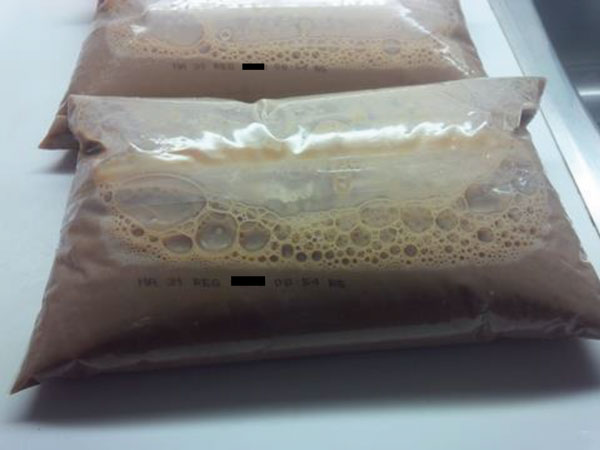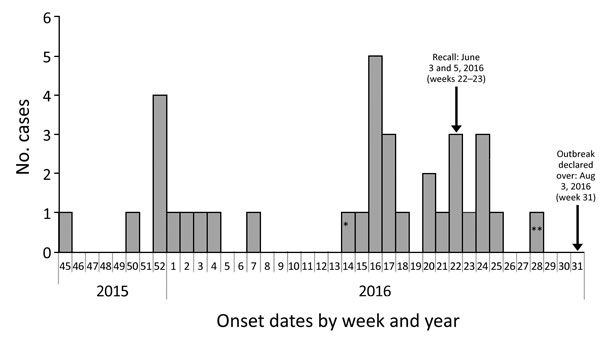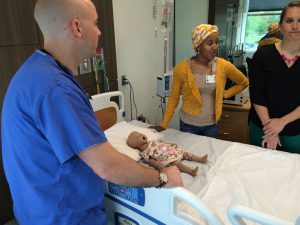Archive for February, 2019
Dengue fever – Jamaica: 339 suspected and confirmed cases, including 6 deaths, reported from Jan 1 through Jan 21
Tuesday, February 5th, 2019Dengue fever – Jamaica
On 3 January 2019, the International Health Regulations (IHR) National Focal Point of Jamaica notified WHO of an increase in dengue cases in Jamaica.
From 1 January though 21 January 2019, 339 suspected and confirmed cases including six deaths were reported (Figure 1). In 2018, a total of 986 suspected and confirmed cases of dengue including 13 deaths have been reported. The number of reported dengue cases in 2018 was 4.5 times higher than that reported in 2017 (215 cases including six deaths). Cases reported to date for 2019 exceed the epidemic threshold (Figure 2).
According to historic data, Jamaica reported a major outbreak in 2016, when 2297 cases of dengue infection including two deaths were reported. Dengue virus 3 (DENV3) and DENV4 circulations were confirmed at the time.
By the end of 2018, the largest number of reported cases were notified by Kingston and Saint Andrew parishes. In 2019 so far, the largest proportion of cases have been reported by Saint Catherine parish.
Laboratory tests have identified DENV3 as the dengue serotype currently circulating.
In January 2019, some countries and territories in the Caribbean region, such as Guadeloupe, Martinique, and Saint Martin, reported an increase in dengue cases. Of note, in Saint Martin and Guadeloupe, serotype DENV1 is currently circulating.
Figure 1. Dengue fever cases and deaths by week of onset from 1 January 2018 through 21 January 2019 in Jamaica*
Public health response
- The Ministry of Health (MoH) declared the dengue outbreak on 3 January 2019.
- Health authorities in Jamaica are implementing measures for the following activities; strengthened integrated vector control, enhanced surveillance of cases, social mobilization, clinical management, enhanced laboratory diagnostic capacity, and emergency risk communications.
- The MoH has been collaborating with the Pan American Health Organization (PAHO/WHO) and other international agencies to strengthen and co-ordinate the response activities.
- Since July 2018, the MoH has intensified its vector control activities.
- The MoH launched the Emergency Operations Centre on 27 December 2018; and fully activated it on 3 January 2019 to facilitate the coordination and reporting of activities. The response activities are geared towards strengthening the response capacity with adequate human resources, as well as supporting efforts to reduce the entomological indices for the Aedes aegypti mosquito across the island and enhancing clinical management capacity.
WHO risk assessment
Jamaica has been reporting dengue cases since 1990 and throughout 2018; however, an increase has been observed since December 2018 exceeding the epidemic threshold. Similar large increases were reported in 2010 (2887 cases), 2012 (4670 cases), and 2016 (2297 cases). The increase of dengue in the Caribbean islands may result in more severe secondary dengue virus infections and require comprehensive risk communication.
WHO advice
On 21 November 2018, PAHO/WHO alerted Member States about an increase in dengue cases in countries and territories in the Americas and recommended coordinated actions both inside and outside of the health sector, including prioritizing activities to prevent transmission of dengue as well as deaths due to this disease.
PAHO/WHO further advises to follow the key recommendations regarding outbreak preparedness and response, case management, laboratory, and integrated vector management as published in the 21 November 2018 PAHO/WHO Epidemiological Update on Dengue, available at the link below.
There is no specific treatment for disease due to dengue; therefore, prevention is the most important step to reduce the risk of dengue infection. WHO recommends proper and timely case management of dengue cases. Surveillance should continue to be strengthened within all affected areas and at the national level. Key public health communication messages should continue to be provided to reduce the risk of transmission of dengue in the population.
In addition, integrated vector management (IVM) activities should be enhanced to remove potential breeding sites, reduce vector populations, and minimize individual exposures. This should include both larval and adult vector control strategies (i.e. environmental management and source reduction, and chemical control measures), as well as strategies to protect individuals and households. Where indoor biting occurs, household insecticide aerosol products, mosquito coils, or other insecticide vaporizers may also reduce biting activity. Household fixtures such as window and door screens and air conditioning can also reduce biting. Since Aedes mosquitoes (the primary vector for transmission) are day-biting mosquitoes, personal protective measures such as use of clothing that minimizes skin exposure during daylight hours is recommended. Repellents may be applied to exposed skin or to clothing. The use of repellents must be in strict accordance with label instructions. Insecticide-treated mosquito nets afford good protection for those who sleep during the day (e.g. infants, the bedridden, and night-shift workers) as well as during the night to prevent mosquito bites.
WHO does not recommend any general travel or trade restrictions be applied based on the information available for this event.
Nigeria: A Lassa fever outbreak affecting people in 16 states has grown to 213 confirmed cases, including 41 deaths.
Tuesday, February 5th, 2019Oman reports one more MERS case, coming just days after it reported four others
Tuesday, February 5th, 201903/02/2019 19-1793
MERS in Riyadh city: 75-year-old male in Riyadh city, Riyadh region Contact with camels: No Case classification: Primary, community acquired Current status: Hospitalized
03/02/2019 19-1794
MERS in Wadi Aldwasir city: 55-year-old male in Wadi Aldwasir city, Riyadh region Contact with camels: Yes Case classification: Secondary, healthcare-acquired Current status: Hospitalized
03/02/2019 19-1795
MERS in Wadi Aldwasir city: 40-year-old male in Wadi Aldwasir city, Riyadh region Contact with camels: yes Case classification: Secondary, household Current status: Hospitalize
Ebola cases in DRC jump to 785
Tuesday, February 5th, 2019“…..Faced with an evolving complex humanitarian crisis, and recent elections complete, WHO Director-General Tedros Adhanom Ghebreyesus should reconvene the Emergency Committee (EC) and consider declaring a Public Health Emergency of International Concern (PHEIC)……..”
Fire engulfs an apartment block in Paris, killing at least 8 and injuring 36; thought to be arson
Tuesday, February 5th, 2019https://www.youtube.com/watch?v=5YbINZCwn_A
2/4/1976: A 7.5-magnitude earthquake levels much of Guatemala City, killing 23,000 people and leaving one million others homeless.
Monday, February 4th, 2019https://www.youtube.com/watch?v=YfaXFtI4HLc
Mayor of Palermo, Italy pushes through the first four applications by migrants seeking residency under their humanitarian status.
Monday, February 4th, 2019“…..By signing their applications, Mr. Orlando hopes to invite a legal challenge by the government that he can take all the way to Italy’s highest court. He intends to argue that Mr. Salvini’s measures are unconstitutional and violate the migrants’ human rights.
“I cannot accept that you produce criminality,” Mr. Orlando said in an interview last month…..
Many liberal mayors across the country, from Naples to Florence to Milan, applauded Mr. Orlando’s intention to defy the government……”
“……Mr. Salvini refused to offer a safe port to the Sea Watch 3, a vessel that had rescued 47 migrants from the Mediterranean Sea. For nearly two weeks, the ship was adrift as Mr. Salvini spoke of forming a “naval blockade” to seal off the country.
The standoff ended on Thursday, only after European neighbors agreed to take in the majority of the migrants….”
Ontario, Canada: Listeria monocytogenes associated with pasteurized chocolate milk
Sunday, February 3rd, 2019“……Thirty-four case-patients met the outbreak definition; only Ontario residents were identified. Eleven case-patients had an onset date during November 14, 2015–February 14, 2016. Onset dates ranged from April 11 to June 20, 2016, for 21 case-patients in the second wave; the remaining 2 case-patients were outliers (Figure 1). Median age was 73 years (range <1 years–90 years). More than half of the case-patients were female (20/34, 59%). Hospitalizations occurred for 32 (94%) case-patients, and 4 deaths (12%) were reported...…”
Hanson H, Whitfield Y, Lee C, Badiani T, Minielly C, Fenik J, et al. Listeria monocytogenes associated with pasteurized chocolate milk, Ontario, Canada. Emerg Infect Dis. 2019 Mar [date cited]. https://doi.org/10.3201/eid2503.18-0742


WHO warns against a counterfeit anti-rabies vaccine now circulating in the Philippines.
Sunday, February 3rd, 2019“….The WHO said that “two falsified vaccines have so far been discovered.” It said that Verorab vaccines with batch number NIE35 and H1833 are counterfeit.….”







